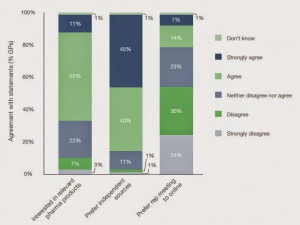According to a new study from M3, you have an average of about 20 hours a week to capture a doctor’s attention while they’re online. However, recently, the question hasn't been whether or not doctors are online, but how do we reach them while they’re online. Results of the M3 survey show that above all else, credibility may be the biggest factor in getting physicians attention.
The study, which surveyed just over 1,000 general practitioners, shows that while doctors are spending time online and looking for a variety of information, many are wary of obtaining that information through pharma companies. While two-thirds of respondents expressed at least some interest in relevant pharma products, a whopping 85% indicated that they prefer independent sources for their information. In addition, 56% specified that a rep meeting would not be preferable to acquiring information online.
More “anti-vendor” sentiment can be found in terms of where doctors are spending their time online. Almost half (45%) said they never visit a device company website when sourcing information while 33% indicated the same for pharma company websites. Consequently, 59% visit the website of a government body at least bi-weekly in obtaining this information.
But what can pharma companies do to present themselves as more trustworthy? Even hard data can often be manipulated and many have a hard time trusting statistics. Certainly “unbiased” sources of information such as third party reports could be used to a degree. Respondents also showed some openness to case reports with 39% citing them as useful.
No matter what the content, one word of advice to pharma companies is keep it concise. This group showed a preference for brevity with 64% indicating that multiple page detail was “not useful”. In addition, as far as what they found “useful”, 77% cited “guideline summaries”, 67% said drug summaries and 42% said single-page detail.
The way drug companies present information may very well be headed for change regardless. The FDA’s recently released draft guidances on social media caused quite a stir upon being published. In addition, big data and mobile are constantly providing opportunity to improve the way we market. That said, the situation would certainly appear to be fluid. After all, would it be that far-fetched if in the near future the average doctor were equipped with Google glass and spending 40 hours a week online?
Contributed by @MikeMadarasz

